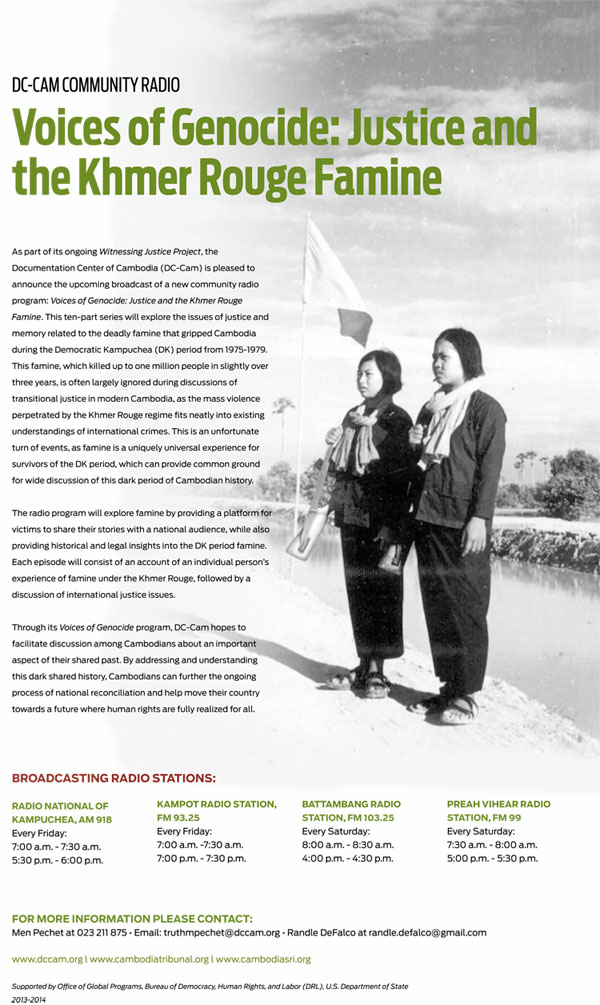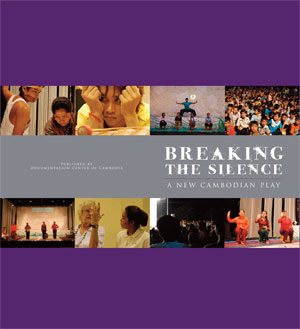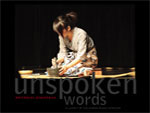|
|
||||||||||||||||||||||||||||||||||||||||||||||||||||||||||||||||||||
| RADIO | ||||||||||||||||||||||||||||||||||||||||||||||||||||||||||||||||||||
 |
||||||||||||||||||||||||||||||||||||||||||||||||||||||||||||||||||||
|
Nhip Sreng, Group Leader, Ministr y of Commerce.
His biography, taken at Tuol Sleng, shows that he was arrested
on February 8, 1977 at the age of 24. No record of his execution has
been located. Source: Documentation Center of Cambodia Archives. |
||||||||||||||||||||||||||||||||||||||||||||||||||||||||||||||||||||
l |
Witnessing Justice 30 Years Later: Building Democracy in Cambodia Through Legal Education | |||||||||||||||||||||||||||||||||||||||||||||||||||||||||||||||||||
l |
Chan Nhoung aka Nuon (Confession on tape dated November, 19, 1977) | |||||||||||||||||||||||||||||||||||||||||||||||||||||||||||||||||||
l |
Interview with Chan Nhoung's relative, January 22, 2000 | |||||||||||||||||||||||||||||||||||||||||||||||||||||||||||||||||||
l |
Interview with Chan Nhoung's relative, January 26, 2000 | |||||||||||||||||||||||||||||||||||||||||||||||||||||||||||||||||||
l |
Youk Chhang, DC-Cam Director, Visiting
Chan Nhoung's relatives
(Photo by Vanthan P. Dara) |
|||||||||||||||||||||||||||||||||||||||||||||||||||||||||||||||||||
|
RADIO PROGRAM 2002-present |
||||||||||||||||||||||||||||||||||||||||||||||||||||||||||||||||||||
|
as Anne Frank’s Diary on a local radio station, Women’s Media Center (WMC), FM 102, which reaches many Cambodian provinces. DC-Cam has produced a radio program on this station two times a week. In addition, our staff members have been guest speakers on an FM 102-hosted talk show which focuses on the Khmer Rouge.
In 2005, DC-Cam expanded its broadcasts to Battambang (also covering portions of Siem Reap, Banteay Meanchey, Pursat and Pailin), Kampong Cham, Sihanoukville and Svay Rieng. We explored various radio formats, such as forums and listener hotlines, to encourage audience participation in discussions of issues related to Democratic Kampuchea. In order to increase the cost-effectiveness of our programming, we opened a new studio at DC-Cam, enabling us to prepare high-quality, pre-recorded tapes and send them to provincial radio stations.
Early in 2008, DC-Cam discontinued broadcasting on WMC, FM 102, since the station now produces its own program about Khmer Rouge history. However, DC-Cam continues to read selected articles from Searching for the Truth, and the publication, Brother Enemy, A History of Democratic Kampuchea (1975-1979), for Kampot Station, and works with VOA (Voice of America Radio) as well.
In 2012, DC-Cam initiated a new radio program entitled "Voices of Genocide Survivors (VoG): Famine in Democratic Kampuchea and Case 002 at the ECCC," which explores the famine which occurred during the Democratic Kampuchea regime. The goals of this program are to provide survivors with legal and historical narratives of a major and often-overlooked source of suffering and mortality under the Khmer Rouge and to provide a common platform for survivors of the Cambodian genocide to share their individual experiences. Through these specific goals, the program aspires to contribute to the larger objective of reconciliation and justice in Cambodia. In total, the VoG project will produce ten episodes, each discussing an aspect of the famine during the Khmer Rouge period in Cambodia. Each episode will be broadcast and re-broadcast as widely as possible throughout Cambodia each month. Moreover, after the initial broadcast, the program will be combined into an anthology and shown throughout Cambodia to highlight the issue of famine, utilizing program episode replays at public forums. These forums will be hosted at sites historically relevant to famine under the Khmer Rouge regime and will engage local survivors, students and community leaders in order to foster community engagement. DC-Cam plans to make the archived radio program series freely available to the public and researchers seeking more information on the Khmer Rouge famine and/or associated legal issues. |
||||||||||||||||||||||||||||||||||||||||||||||||||||||||||||||||||||
|
||||||||||||||||||||||||||||||||||||||||||||||||||||||||||||||||||||
| A New Cambodian Play by the Survivors of Khmer Rouge genocide | ||||||||||||||||||||||||||||||||||||||||||||||||||||||||||||||||||||
|
||||||||||||||||||||||||||||||||||||||||||||||||||||||||||||||||||||
|
over four years
since I was invited by Fred Frumberg, executive director of
Amrita Performing Arts, to give a workshop for the theatre
teachers at the Royal University of Fine Arts. Using text
fragments of my beloved writer Samuel Beckett, I introduced six
actors/teachers (four of which perform in this show) to the
world of western contemporary theater. During these two weeks,
some of the actresses started tell me fragments of their
childhood stories. Those were the seeds of our first new play,
‘3 year, 8 months, 20 days’: a production based on the memories
of three actresses as young girls during Pol Pot’s reign,
featuring Morm Sokly, Kov Sotheary and Chhon Sina. They play was
conceived as a small scale indoor performance and has been
presented in Phnom Penh and at the 2007 Singapore International
Arts Festival. It was only at that stage that I realized that
this production, which delved deeply into Cambodia’s
recent history, would reach a very limited Cambodian audience.
Having gained more and more insight into the effects of the
genocide and the near extinction of entire generations of
artists and intellectuals, I realized I had to make a second
play. This new production would need to be made to tour
throughout the country and deal not only with history, but also
with the question of how to go on. Breaking the Silence is based
on many interviews I conducted during a research trip in January
2008, several meetings with Chhang Youk – director of DC-Cam,
the viewing of hours of footage and reading every available book
on the topic. The main goal of this production is to find a way
out of trauma’s silence; contributing to open dialogue as
part of the process of reconciliation. Travelling, talking, reading, viewing and most of all: working with this amazing team, helped me get closer to knowing the Cambodian soul. And I am grateful to the beautiful Cambodian poets, especially Sam Ou Oeur who is very present in this show. They all helped me to begin to understand. I hope you will appreciate Breaking the Silence. Synopsis O, darling, my darling! Now you are dead. You’re shot dead... Buddho! You’ve left me alone in the middle of this island From today onward I shall have no hope. This play is about regaining hope. We will tell you stories. The real stories of people who survived the Khmer Rouge era. Stories that continue to evolve. You’re invited to imagine their future, which could also be your future. 1. A story about divided people: two women and two men in their 50’s. 2. A story about two women who were young, so very young when their lives were ruined: and now are two adult women in their 40’s. 3. A story about betrayal and guilt: a 76 year old woman, caring for her 51 year old son. 4. A story about a student who dreamed about a better world: a man of 52 meets his mother of 75. 5. A story about a little girl, who wanted to say sorry but could not: she’s now 38 years old. 6. A story about a girl who stopped talking: then she was a teenager, now she’s 47. 7. A story about a boy and a girl who were once upon a time dear friends: they are now nearly 50 years old. I won’t mind if you have thoughts to add to mine. I won’t say yours word are “good” or “not good” If you have more to add that would be wonderful. |
||||||||||||||||||||||||||||||||||||||||||||||||||||||||||||||||||||
|
||||||||||||||||||||||||||||||||||||||||||||||||||||||||||||||||||||
| Jennifer Ka is a Cambodian-American undergraduate at the University of California, San Diego majoring in Psychology. She has been involved in the Cambodian community for several years and is part of the Cambodian Student Association at her university. For the club’s annual show she wrote, directed, acted, and choreographed the play, “Unspoken Words.” The play is about a mother and a daughter who are unable to connect because the mother hides the pain of her past of the Khmer Rouge Genocide from her daughter. This is a past that the mother herself has not faced. Through the play, we witness one of the main reasons why there is a gap between the new generation and old generation of Cambodians. | ||||||||||||||||||||||||||||||||||||||||||||||||||||||||||||||||||||
¿ | Listening to A History of Democratic Kampuchea (1975-1979) | |||||||||||||||||||||||||||||||||||||||||||||||||||||||||||||||||||
|
¿ |
Listening to Breaking the Silence | |||||||||||||||||||||||||||||||||||||||||||||||||||||||||||||||||||
|
¿ |
Unspoken Words | |||||||||||||||||||||||||||||||||||||||||||||||||||||||||||||||||||
|
¿ |
Voices of Genocide Survivors (VoG): Justice and the Khmer Rouge Famine | |||||||||||||||||||||||||||||||||||||||||||||||||||||||||||||||||||


